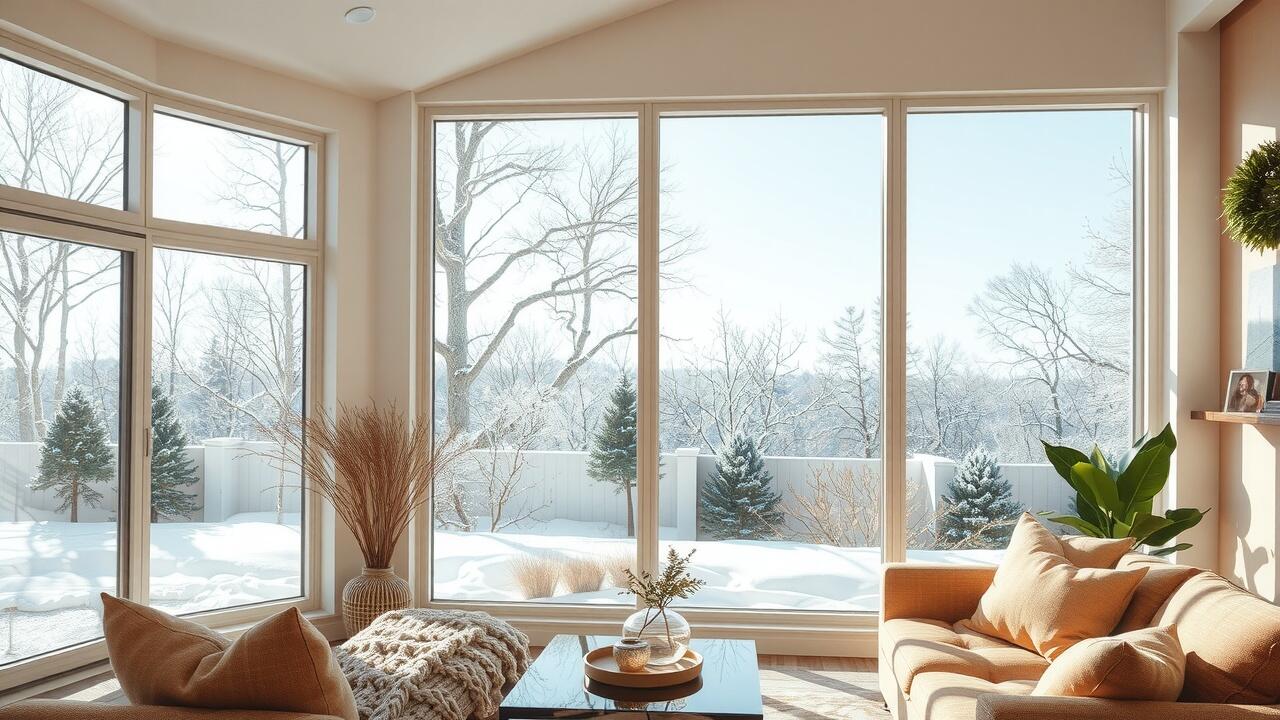Key Takeaways
- Understanding energy-saving windows can lead to lower heating expenses.
- Efficient window installations contribute significantly to decreased heating costs.
- Various types of energy-efficient windows can enhance financial savings on heating.
- Proper installation methods are crucial for maximizing window efficiency.
- Beyond cost savings, energy-efficient windows offer additional advantages.
- Regular upkeep is essential for maintaining the performance of energy-efficient windows.
Reduce Heating Bills With Efficient Windows | Understanding Efficient Windows
Efficient windows play a crucial role in helping homeowners reduce heating bills with efficient windows. These specially designed windows minimize heat transfer, effectively reducing heat loss during colder months. By incorporating features like thermal breaks and insulated windows, they enhance the performance of heating and cooling systems. The adoption of energy-efficient appliances and insulated windows contributes significantly to reducing energy consumption throughout the home. Homeowners can achieve better comfort and significant savings on energy costs by investing in these energy-saving solutions. Efficient windows represent a proactive approach to managing heat and ensuring that heating and cooling are more effective.

reduce heating bills with efficient windows | What Are Efficient Windows?
Efficient windows are designed to enhance energy efficiency and minimize heat flow between the interior and exterior of a home. These windows significantly reduce heating bills with efficient windows by limiting thermal transfer, which helps maintain comfortable indoor temperatures. The use of advanced materials and technologies can curb energy costs associated with heating and cooling. By improving heat conductivity and optimizing heat exchange, homeowners can benefit from substantial energy savings, leading to lower costs of electricity.
Energy-efficient windows are equipped with features that support HVAC systems’ performance. The right choice of windows can dramatically affect how much energy is needed to keep a home heated during colder months and cooled during warmer seasons. By reducing heat loss and gain, these windows allow for more effective climate control, ensuring energy savings year-round. Homeowners looking to reduce heating bills with efficient windows can enjoy a comfortable living environment while contributing to a more sustainable future.
Key Features of Efficient Windows
Efficient windows incorporate advanced insulation systems that significantly contribute to reducing heating bills with efficient windows. These windows minimize thermal bridging, which can lead to heat loss during colder months. By utilizing materials with high thermal resistance, they enhance temperature regulation within the home. This, in turn, leads to less strain on the HVAC system and furnaces, resulting in lower energy consumption. Homeowners can further amplify these benefits by using appropriate window coverings and programmable thermostats to optimize energy efficiency.
The design of efficient windows often includes multiple panes of glass, such as double or triple-paned options, which create insulated air spaces. This design effectively blocks solar heat gain in the summer while retaining warmth in the winter, aiding in conserving energy throughout the year. Investing in efficient windows not only enhances comfort levels but also plays a crucial role in cutting down utility costs. Homeowners looking to reduce heating bills with efficient windows should consider these features carefully to maximize energy savings.
How Efficient Windows Help Reduce Heating Bills
Efficient windows play a crucial role in reducing heating bills with efficient windows by enhancing insulation and minimizing energy consumption. The U.S. Department of Energy emphasizes the importance of understanding solar heat gain and the role of the solar heat gain coefficient in selecting windows that will maintain a comfortable indoor environment. Triple-pane windows provide superior insulation value compared to single or double-paned options, effectively limiting the demand on HVAC systems and boilers. By preventing excessive heat loss and managing solar heat gain, homeowners can significantly decrease reliance on electricity for heating, which leads to lower monthly bills. Conducting energy audits can further inform choices on window upgrades that will optimize home efficiency and maximize savings.
Insulation and Energy Transfer
Efficient windows play a crucial role in maintaining optimal indoor temperatures while minimizing energy loss. Proper insulation and sealing around windows help reduce energy loss, which can significantly reduce heating bills. This control over heat retention means that homeowners can enjoy a comfortable living environment without the burden of excessive heating costs. Energy-efficient replacement windows are designed to enhance heat loss reduction, ensuring that indoor spaces remain warm during colder months.
The technology behind energy-efficient windows involves advanced materials and designs that contribute to overall energy efficiency. These windows help reduce costs on your monthly energy bills by preventing unwanted drafts and heat escape. By investing in energy-efficient windows, homeowners can not only reduce heating bills but also enjoy the benefits of reduced energy bills year-round. The initial energy-efficient windows cost is often offset by the savings accrued over time, making them a smart choice for any home.
| Window Type | Material | U-Value (W/m²K) | Benefits |
|---|---|---|---|
| Double Glazing | Glass | 1.2 | Reduces heat loss and noise |
| Triple Glazing | Glass | 0.8 | Maximizes insulation and energy efficiency |
| Low-E Windows | Glass Coated with Low-Emissivity | 1.1 | Reflects heat back indoors, reducing heating costs |
| Vinyl Windows | Vinyl | 1.3 | Energy-efficient and low-maintenance |
The Role of Window Frames and Materials
Window frames and materials significantly influence the overall effectiveness of energy-efficient windows. Selecting high-quality frames can greatly reduce heat transfer through window surfaces. Energy-efficient window solutions, such as those made from vinyl or fiberglass, provide better insulation than traditional materials. This improved performance can lead to a noticeable decrease in total heat loss and contribute to reduced heating bills with efficient windows. Proper installation and sealing further enhance these benefits, ensuring that residential heating systems operate more efficiently.
The choice of window frames can also impact cooling costs during hotter months. Energy-efficient windows with well-insulated frames reduce reliance on artificial heating in winter while keeping homes cool in summer. Replacing old single-paned windows with energy-efficient replacements not only lowers energy bills but also improves the overall comfort of your living space. By integrating the right materials with effective design, homeowners can achieve significant savings on both heating and cooling energy, making a lasting impact on their monthly expenses.
Types of Efficient Windows for Energy Savings
Efficient windows play a crucial role in reducing heating bills with efficient windows, especially when paired with energy-saving glass options. Double and triple-paned windows are designed to promote heat transfer prevention, effectively blocking excess heat from entering or escaping your home. This results in significant energy efficiency improvements, helping to lower your current energy bills and stabilize monthly energy bills. Low-E glass windows are another popular choice, as they enhance energy efficiency by reflecting heat back indoors during winter while keeping it out in summer. By investing in these energy-efficient models, homeowners can expect considerable savings and better comfort, ensuring an impressive energy efficiency story unfolds throughout the years. Efficient window coverings can further complement these strategies, maximizing energy efficiency and enhancing overall performance.

Double and Triple-Paned Windows
Installing double and triple-paned windows is a proven approach to reduce heating bills with efficient windows. These windows feature multiple panes of glass that create air or gas-filled spaces, significantly improving thermal performance. This design prevents indoor heat from escaping during the winter and keeps your home cooler during the summer, leading to lower summer cooling costs. Ultimately, these energy-efficient windows rank high among home energy efficiency upgrades, actively contributing to reduced HVAC maintenance expenses and overall energy costs.
Investing in double and triple-paned windows also enhances the long-term value of your property. While initial windows costs may be higher than standard options, the energy-saving benefits they provide make them a wise choice for energy-efficient home improvements. As heat moves less effectively through these advanced windows, homeowners can expect substantial savings on their heating and cooling bills. Replacement windows of this caliber not only promote a comfortable indoor environment but also pay dividends in energy efficiency over time.
Low-E Glass Windows
Low-E glass technology provides an effective means to reduce heating bills with efficient windows. This type of glass features a special coating that acts as a thermal shield, reflecting heat back into the home during the winter and deflecting it away in the summer. Such a feature prevents heat transfer, contributing to long-term energy reductions and ensuring optimal energy efficiency. Homeowners can experience substantial energy savings through this kind of window, making the investment in window replacement cost worthwhile for an energy-efficient home.
Investment in Low-E glass can yield significant annual energy savings, particularly for those currently living with inefficient windows. By keeping indoor temperatures consistent, these windows help improve overall comfort levels and reduce the dependency on heating systems. Choosing windows with this advanced technology enhances local energy efficiency and supports a greener environment while effectively helping to reduce heating bills with efficient windows.
Installing Efficient Windows
Choosing the right windows for your home is crucial to reduce heating bills with efficient windows. Optimal windows are designed to minimize direct heat transfer, helping to maintain efficiency throughout the year. Double and triple-paned options provide excellent insulation against nighttime heat loss while also minimizing low solar heat gain during warm months. This complete cooling solution significantly enhances overall energy efficiency. Although window costs can vary, investing in energy-efficient products pays off over time by reducing heating bills with efficient windows and addressing non-solar heat flow, tailoring your living space for maximum comfort all year round.
Choosing the Right Windows for Your Home
Selecting the right windows for your home is essential for achieving energy-efficient solutions that effectively reduce heating bills with efficient windows. Homeowners should consider energy-efficient replacements that meet strict energy efficiency standards. Low-e windows, for instance, allow for optimal thermal performance, minimizing heat transfer and enhancing comfort. The costs associated with new replacement windows may vary, but investing in high-quality options can lead to long-term savings on energy bills. Exploring different styles, including storm windows/window panels, can provide additional protection and energy-saving guarantees for your residential space.
Examining various energy-efficient choices is crucial for making informed decisions. Homeowners may want to balance aesthetics with functionality by incorporating residential window coverings that complement their designs while maximizing energy performance. Optimal windows explain the importance of selecting designs that cater to specific climates, ensuring that your home remains comfortable year-round. Understanding new window costs alongside potential savings can make the investment worthwhile, leading to a more sustainable living environment that reduces heating bills with efficient windows and improves overall property value.
- Consider energy efficiency ratings when selecting windows.
- Explore various styles to complement your home’s architecture.
- Look for windows with low maintenance requirements.
- Ensure windows provide adequate insulation for your climate.
- Research installation options that offer professional expertise.
- Evaluate long-term savings compared to initial costs.
- Check for warranties and guarantees on window performance.
Professional vs. DIY Installation
Installing high-performance windows can significantly reduce heating bills with efficient windows. A professional installation ensures that the effective insulation system works as intended, creating a barrier against temperature fluctuations. This is especially important if you are replacing 30-year-old windows, as newer models offer major energy efficiency improvements. Homeowners can expect reduced annual energy costs and less strain on their HVAC systems, contributing to optimal home temperatures.
DIY installation may seem appealing, but it carries risks without the expertise of professionals. Incorrect installation can lead to gaps and leaks, undermining the energy-saving benefits of your new windows. To truly maximize the performance of your optimal windows today, consider the current efficiency tax incentives available, which can further offset your energy costs. Quality installation not only enhances the effective insulation system but also ensures that your investment in high-performance windows pays off in the long run.
Additional Benefits of Efficient Windows
Efficient windows provide numerous advantages beyond financial savings. These windows help reduce heating bills with efficient windows by minimizing unwanted heat loss during winter and reducing the impact of summer heat. Energy-efficient models often come equipped with various energy-efficient features, such as gas-filled windows and low-emissivity (Low-E) coatings, which significantly enhance temperature control. Homeowners can achieve their energy-saving goals by investing in energy-efficient upgrades that promote lower household energy use. With the right installation, efficient windows facilitate different temperature settings throughout the home, leading to potential energy savings and improved comfort levels year-round.
Enhancing Comfort Levels in Your Home
Efficient windows play a critical role in enhancing the overall comfort levels within your home. By effectively minimizing specific energy loss, these windows help maintain a stable indoor temperature. Features such as storm windows and new-construction windows incorporate energy-efficient technologies to combat unwanted solar heat. Homeowners often find that energy consumption drops significantly with the installation of residential windows designed to optimize energy performance. This creates a more pleasant living environment while allowing you to reduce heating bills with efficient windows.
The advantages of energy-efficient features extend beyond just temperature control. Homeowners can experience reduced heating bills with efficient windows, leading to more substantial savings over time. Integrating energy-efficient lighting and participating in green energy programs can further bolster your home’s efficiency as energy saver solutions become increasingly important. With improved insulation and lower energy loss, residents enjoy a more comfortable atmosphere while contributing to a sustainable future.
| Window Type | Energy Efficiency Rating | Benefits |
|---|---|---|
| Double-Glazed Windows | U-value: 1.5 W/m²K | Improved insulation, reduced noise |
| Low-E Glass Windows | U-value: 1.3 W/m²K | Reflects heat, minimizes UV light |
| Storm Windows | U-value: 1.7 W/m²K | Adds a protective layer, reduces drafts |
| Casement Windows | U-value: 1.4 W/m²K | Provides airtight sealing when closed |
| Triple-Glazed Windows | U-value: 0.9 W/m²K | Maximum insulation, enhanced comfort |
Increasing Property Value
Investing in quality windows can significantly boost your property’s market value. Homebuyers increasingly seek energy-efficient features that promise cost savings. By choosing to reduce heating bills with efficient windows, homeowners can boast about lower monthly utility bills. Upgrading to new windows, especially those with insulation levels optimized to create consistent indoor temperatures, positions a property favorably in the market. Such improvements not only enhance comfort but also appeal to eco-conscious buyers who prioritize sustainable living.
Old appliances and inefficient windows detract from a home’s appeal. A wood window replacement or installation of energy-efficient window attachments can serve as a selling point. Features like low-E glass and thermal mirror technologies further enhance the attractiveness of a home. Buyers are often willing to pay more for properties that require less energy for heating and cooling. Thus, replacing outdated windows with modern, efficient options can yield a substantial return on investment.
Maintenance Tips for Efficient Windows
Regular maintenance of your efficient windows is essential to maximize their ability to reduce heating bills with efficient windows. This routine includes inspecting seals and weather stripping to ensure exceptional insulation, which directly impacts your home’s ability to maintain a consistent indoor temperature. Homeowners may benefit from upgrading insulation around single-paned windows and integrating top-tier window solutions like solar control glass. These strategies not only enhance efficiency improvements but also prolong the hvac system life, especially during cooling seasons. For those considering new construction windows, investing in expensive Energy Star-rated options can yield significant energy savings. By taking these steps, you can ensure your windows continue to deliver their promised benefits and effectively reduce heating bills with efficient windows.
- Regularly inspect window seals and weather stripping for any signs of wear or damage.
- Clean window frames and glass to prevent dirt buildup that can obstruct efficiency.
- Check for condensation between window panes, indicating a seal failure.
- Upgrade to double or triple-paned windows if your current windows are single-paned.
- Consider adding window treatments that provide additional insulation, such as heavy drapes or thermal shades.
- Schedule professional inspections to assess overall window performance and energy efficiency.
- Stay informed about local rebates or tax incentives for energy-efficient window upgrades.
Conclusion
Efficient windows are essential for those looking to reduce heating bills with efficient windows. They create an effective thermal barrier that minimizes heat transfer, enabling superior insulation properties. With excellent insulation capabilities, these windows contribute to ongoing temperature regulation within the home. This helps maintain a comfortable indoor temperature and supports the efficiency of HVAC equipment. As a result, homeowners can experience greater temperature stability, leading to significant savings in annual household energy costs. Ultimately, investing in efficient windows not only addresses immediate heating expenses but also enhances overall energy performance.
FAQS
How can energy-efficient windows help homeowners reduce heating energy costs and improve their HVAC strain?
Energy-efficient windows are designed to significantly reduce energy consumption by minimizing heat transfer through window surfaces. By choosing energy-efficient models that reflect heat and block excess heat, homeowners can achieve maximum energy efficiency. This not only reduces heating energy bills but also lessens the burden on HVAC systems, leading to optimal windows that maintain efficiency and reflect the benefits of energy-efficient features. Overall, investing in top-tier energy efficiency through quality windows can result in reduced heat transfer and significant savings on expensive energy costs.
What are some ways to maintain efficiency and optimize energy performance with windows to reduce heating bills?
Maintaining efficiency with windows is crucial for reducing heating bills. Energy-efficient models reduce heat transfer through window surfaces, which means less reliance on heating systems. Optimized energy performance of windows not only decreases HVAC strain but also mitigates the costs associated with artificial cooling. Investing in expensive ENERGY STAR-rated windows is a smart choice for homeowners looking to minimize heat transfer and maintain comfortable indoor temperatures.
How do optimal windows explain the benefits of energy-efficient models in reducing heating bills and minimizing heat transfer through window surfaces?
Optimal windows explain how energy-efficient models reduce heat transfer significantly, leading to reduced heating bills for homeowners. By selecting windows that minimize heat transfer through window surfaces, you can enjoy a more energy-efficient home. Expensive ENERGY STAR windows are an excellent choice for achieving these benefits, as they are designed to effectively lower energy consumption and improve comfort.
How do energy-efficient windows contribute to lowering heating expenses while enhancing overall home comfort?
Energy-efficient models reduce heating bills by minimizing heat transfer through window surfaces. The optimal windows explain their benefits by providing superior insulation, allowing homeowners to avoid the expensive Energy Star costs associated with traditional windows.
How do optimal windows contribute to reducing expensive heating costs for homeowners?
Optimal windows explain how energy-efficient models reduce heat transfer, leading to lower heating bills and enhanced comfort in the home. By installing windows that meet Energy Star standards, homeowners can further minimize their heating expenses while ensuring effective temperature regulation.
How do energy-efficient models explain the importance of selecting optimal windows to reduce heat transfer and lower expensive heating costs?
Energy-efficient models explain that choosing optimal windows can significantly reduce heat transfer, which directly impacts heating bills. By installing windows designed for energy efficiency, homeowners can enjoy reduced energy costs while benefiting from the advantages of Energy Star-rated products, which are proven to lower expensive heating expenses effectively.
How do optimal windows impact the performance of energy-efficient models in reducing heat transfer and making heating bills more manageable?
Optimal windows play a crucial role in how energy-efficient models reduce overall home heating costs by minimizing heat transfer. By incorporating advanced insulation technologies, these windows significantly lower expensive heating bills while providing a more comfortable living environment. Energy-efficient windows specifically designed to meet Energy Star requirements further enhance this performance, making them a smart choice for homeowners.
How do energy-efficient models influence the effectiveness of optimal windows in reducing heat transfer and lowering expensive heating bills?
Energy-efficient models play a crucial role in how optimal windows explain the reduction of heat transfer, which ultimately reduces the expensive energy costs associated with heating. By utilizing windows designed for energy efficiency, homeowners can significantly decrease their heating bills while enjoying the benefits of a more comfortable living environment.
How do energy-efficient models and optimal windows work together to minimize heat transfer and ultimately lower expensive heating bills?
Energy-efficient models reduce heat transfer significantly by utilizing optimal windows that are designed to enhance insulation. By selecting windows with low thermal conductivity and proper sealing, homeowners can create a barrier that minimizes heat loss, making their heating bills more manageable and improving overall comfort in their homes.
How do energy-efficient models help to explain the impact of optimal windows on reducing heat transfer and lowering expensive heating bills?
Energy-efficient models explain that optimal windows help reduce heat transfer, which can significantly lower expensive heating bills. By using windows that meet energy-efficient standards, homeowners can maintain better indoor temperatures, thereby reducing their reliance on heating systems. This not only leads to lower overall costs but also contributes to better energy management in homes.

